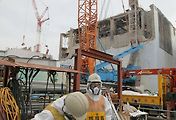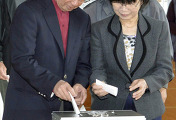외교관과 해병대
4월12일 류큐신보(琉球新報) 1면에 미국 정부의 외교관과 해병대 장교가 똑같은 질문에 답한 기사가 실렸다. 우선 외교관의 답이다. 척 헤이글 미 국방장관(필자는 국방장관을 민간인, 즉 외교관으로 기술했다)은 최근 도쿄에서 미국이 오키나와 현지사의 요구대로 5년 내에 후텐마 해병대 기지를 폐쇄할 수 있겠느냐는 질문에 “우리는 오키나와에 기지 부담을 줄이는 문제를 계속 논의하기를 원한다”고 답했다.
오키나와에 주둔한 해병대 최고지휘관 존 위슬러 중장은 4월3일 똑같은 질문에 “아니요”라고 답했다. 그는 오키나와 북부 헤노코에 새 기지가 완공되지 않는 한 후텐마 기지는 폐쇄되지 않을 것이라고 했다. 순조롭게 진행되어도 10년은 걸릴 거라고 했다. 물론 그것은 순조롭게 진행되지 않을 것이다. 오키나와인들의 절대다수가 새 기지에 반대하고 있고, 많은 이들이 기지 건설을 막기 위해 직접 행동을 할 준비가 돼 있다. 위슬러의 암묵적 메시지는 “오키나와인들이 새 기지에 반대하지만 않았어도 후텐마 기지는 이미 오래전에 사라졌을 것”이라는 것이다. 다시 말해 후텐마에 해병대 기지를 유지하는 것은 미국 나름의 보복 조치라는 의미다. 하지만 나는 해병대 쪽 대답이 더 마음에 든다. 무슨 말인지 이해가 되기 때문이다.
18년
바로 아래 기사는 4월12일이 미국과 일본 정부가 후텐마 미군 기지를 기노완시에서 이전하겠다고 발표한 지 18년째 되는 날이라는 점을 조명했다. 오키나와인들이 새 기지 건설에 반대하지 않았다면 후텐마 기지가 지금쯤 폐쇄됐을 것이란 점에서 위슬러 말은 아마 맞을 것이다. 그 대신 새 기지 건설 예정지인 헤노코의 오우라만(灣)은 생태적 재앙을 겪었을 것이다. 오키나와인들은 그동안 경험했던 집단적 자부심과 자존감을 느끼지 못했을 것이다. 지금까지는 헤노코에서 한줌의 흙도 한 곳에서 다른 곳으로 옮겨지지 않았다. 놀라운 것은 미국과 일본이 18년 전 그 계획을 포기할 생각을 한 번도 하지 않았다는 사실이다.

헌법 9조에 노벨평화상을?
같은 신문 29면에는 노벨상위원회가 일본 헌법 9조의 노벨평화상 후보 신청을 받아줬다는 기사가 실렸다. 여기서 “받아줬다”는 말은 278개의 다른 신청자들과 함께 후보로 올려줬다는 뜻이다. 몇 달 전 나는 선의로 이 운동을 시작한 한 젊은 여성의 전화를 받았다. 나는 길고도 고통스러운 대화를 통해 왜 그 청원을 지지하지 않는지 설명했다. 우선 그것은 자기만족의 측면이 크다. 신청에 참여한 사람들은 헌법 9조 지지자들이고, 따라서 아무리 간접적으로 한 것이라도 그들 스스로 수상 후보로 자천하는 것처럼 보인다. 둘째, 더 중요하게는, 내가 예전에 이 코너에서 썼듯이 여론조사 결과 일본인 51%가 헌법 9조를 지지한다고 답하면서도 81%가 일·미 안보조약을 지지하는 것으로 나왔다. 안보조약을 반대하는 사람은 11%에 불과했다. 헌법 9조를 지지하는 대다수가 안보조약을 지지한다는 의미다. 이 사람들은 평화에 헌신하는 것이 아니다. 오히려 전쟁이 일어날 경우 다른 누군가가 그들 대신 싸워주기를 바란다. 그것은 이해할 만 하지만 상을 받을 정도는 아니다. 그리고 미군기지를 일본, 대부분 오키나와에 들여놓은 근원이 바로 안보조약이다. 헤노코에 새 기지를 지으려는 압력 뒤에도 안보조약이 있다.
헌법 9조의 종말?
이튿날부터 거의 매일 이 신문에는 자민당 정부의 ‘해석에 의한’ 헌법 9조 변경 계획에 대한 기사가 담겼다. 자세히 설명할 필요가 없을 정도지만, 일본 정부는 전쟁, 전쟁 위협, 전쟁 준비를 포기하도록 하는 9조에 대한 해석을 전쟁을 수행하고, 전쟁 위협을 하며, 전쟁 준비를 하는 의미로 바꾸려 한다는 것이다. 우리는 이 놀라운 논법의 전례를 조지 오웰의 유명한 소설 <1984>에서 “전쟁이 곧 평화”라는 정부 슬로건에서 찾을 수 있다. 노벨상위원회가 일본 헌법 9조에 상을 주고자 한다면 서두르는 편이 좋을 것이다.
This Week’s Newspapers
The Diplomat and the Marine
On the front page of the 12 April Ryukyu Shimpo is an article in which both a US Government diplomat and a US Marine answer the same question. I will give the diplomat’s answer first. When he was in Tokyo recently, US Secretary of Defense Chuck Hagel was asked if the US would be able to shut down Futenma Marine Airbase within five years, as Okinawa‘s Governor has requested. Hagel said, “We want to continue to pursue discussions concerning the reduction of the burden of bases on Okinawa.”
Asked the same question on 3 April, Lt. General John E Wissler, the top Marine officer in Okinawa, said, “The answer is ’no‘”. He said that the base will not be closed until the new Marine base at Henoko, in northern Okinawa, is completed. Assuming that it goes smoothly, that is expected to take ten years. And of course it will not go smoothly. In fact it might not take place at all. The great majority of Okinawans are opposed to this new base, and many of them are prepared to take direct action to prevent its construction. Wissler’s unspoken message is, “If the Okinawans hadn‘t opposed the new base, Futenma might have been gone long ago.” In a way, keeping the Marine base in Futenma is America’s revenge.
Still, I like the Marine better. You can understand what he‘s saying,
Eighteen Years
Immediately below that is an article noting that 12 April marked the eighteenth year since the US and Japanese Governments announced that they were going to remove the Futenma US Marine Airbase from Ginowan City. Wissler is perhaps correct that if Okinawans hadn’t opposed construction of the new base, Futenma Base would have been closed down by now. At the same time, Oura Bay, where the new base is to be built, would have suffered ecological catastrophe. And the Okinawans would have not experienced the great gains in collective pride and self-respect they have experienced over those years. So far not a shovelful of dirt has been moved from one place to another at Henoko. What is amazing is that the US and Japan haven‘t had the wit to give up the plan.
Nobel Peace Prize for Article 9?
On Page 29 of the same paper is an article reporting that the Nobel Prize Committee has accepted the application nominating Article 9 of the Japanese Constitution for the Nobel Peace Prize. “Accepted” here means accepted as an application, along with 278 other applications. Several months ago I received a telephone from the good-hearted young woman who started this movement, and we had a long and painful conversation in which I explained why I would not become a sponsor. First, it has the feel of self-congratulation. The people who sent in this application are supporters of Article 9, so it seems as though they are, however indirectly, nominating themselves for the prize. Second, and more important, as I have written here before opinion polls have shown that while about 51% of the Japanese public say they support Article 9, 81% say they support the Japan-US Security Treaty, and only 11% say they positively oppose it.. This means that not all, but the great majority, of the people who support Article 9 also support the Security Treaty. These people are not committed to peace; rather they are hoping that should war come, someone else will fight it in their place. This is understandable, but not prize-winning. And it is the Security Treaty that is the basis for bringing US military bases into Japan - mostly Okinawa. It is the Security Treaty that is behind the pressure to build the new base in Henoko.
The End of Article 9?
The newspaper on the following day, and about every day since then, have contained articles on the LDP Government’s plan to change Article 9 “by reinterpretation”. No need to explain the details; what it amounts to is that the Government is planning to “interpret” Article 9, which says Japan renounces war, threat of war and preparation for war, to mean that it is permitted for Japan to carry out war, threaten war and prepare for war. We can find a precedent for this astounding reasoning in George Orwell‘s great counter-utopian novel 1984, in which one of the government’s slogans is “War is Peace”. If the Nobel Peace Prize Committee wants to give the prize to the Japanese Constitution‘s Article 9, they would do well to hurry.
<정리 | 손제민 워싱턴특파원 jeje17@kyunghyang.com>
'=====지난 칼럼===== > 더글러스 러미스 칼럼' 카테고리의 다른 글
| 무인기 폭격이 전투인가 (0) | 2014.06.16 |
|---|---|
| 법률의 불법성과 근거없는 낙관주의 (0) | 2014.05.26 |
| 누가 누구의 ‘도모다치’인가 (0) | 2014.03.25 |
| 아베·오바마와 오키나와의 싸움 (0) | 2014.02.11 |
| ‘오키나와와 식민지’의 엘리트 계급 (0) | 2014.01.13 |




댓글